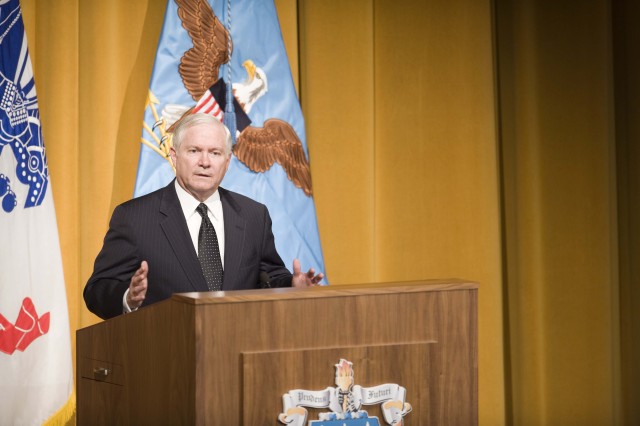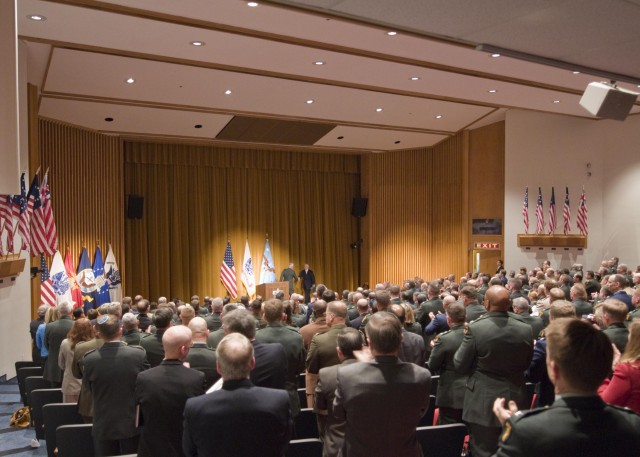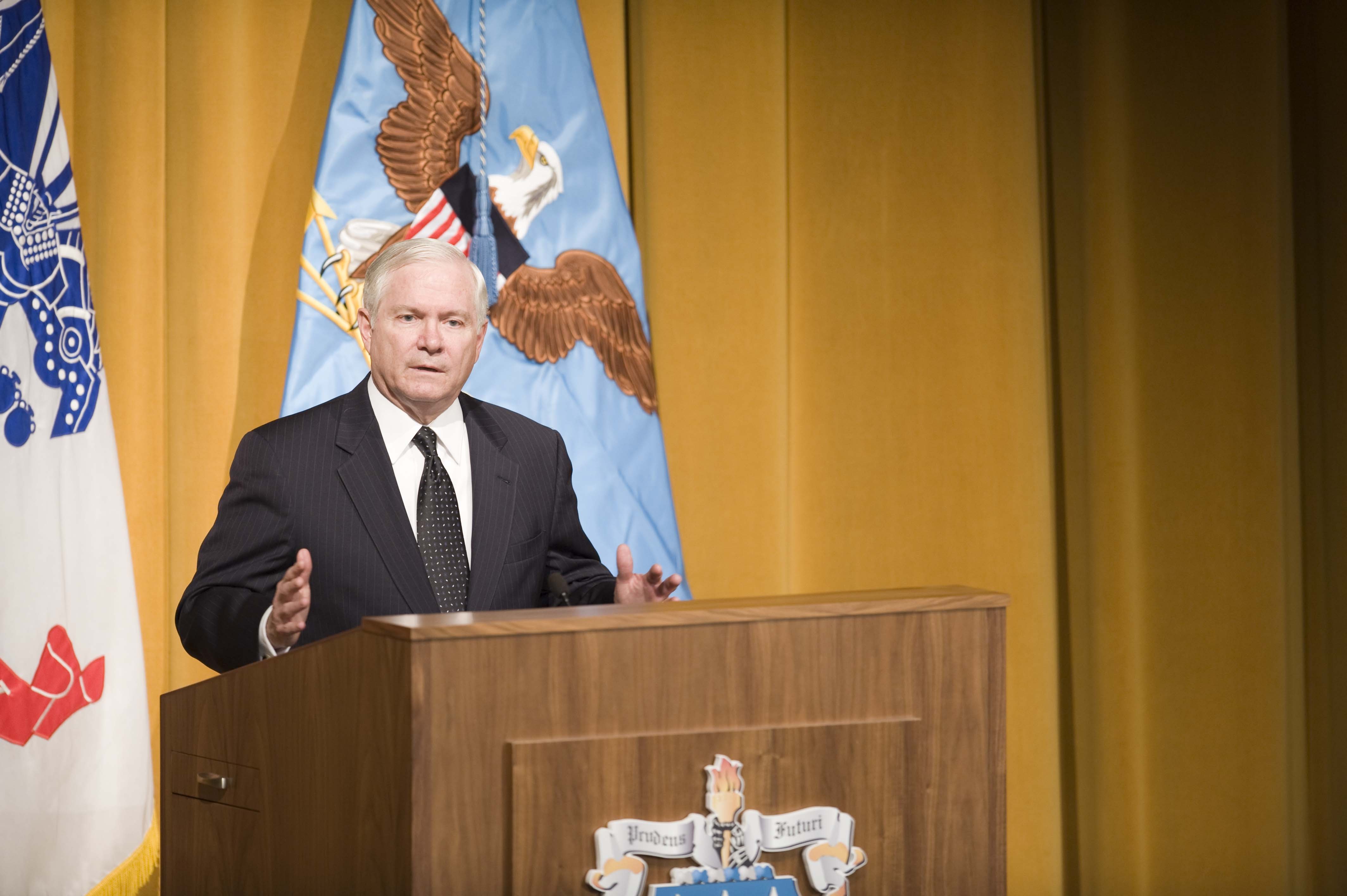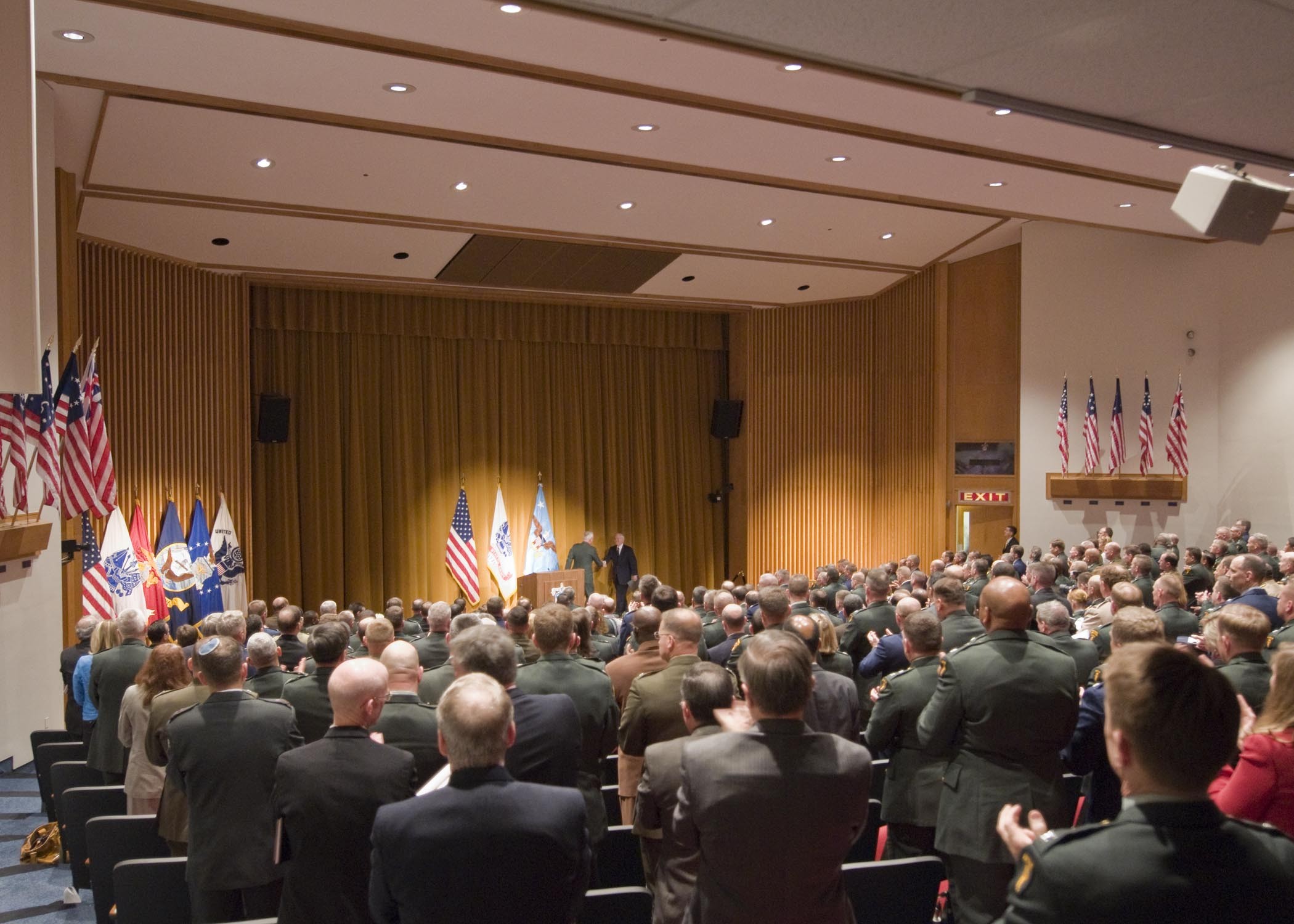Secretary of Defense Robert Gates spoke to Army War College students and selected faculty in Bliss Hall April 16, discussing the budget recommendations he made to President Barack Obama in light of the importance of taking care of Soldiers and their families and adapting the force to be more agile and fiscally efficient.
Gates spoke to an audience of almost 400: the U.S. military officers, senior federal civilians and international officers who comprise the Army War College Class of 2009, as well as teaching faculty during the hour-long lecture and question-and-answer session.
Gates said that his proposal aims to get rid of waste and to institutionalize the needs of today's war fighters, whose needs have generally been supplied via supplemental spending rather than in the base defense budget and to provide the leaders in the field a "seat at the table."
Reliance on supplemental funding for programs like family support, wounded warrior care, and others puts them at risk in the event of funding shortfalls, he said. Shifting family programs from supplemental appropriations to the base budget ensures those programs will be sheltered.
"The top priority recommendation I made to the president was to move programs that support the warfighters and their families into the services' base budget, where they can acquire a bureaucratic constituency and sustainable long-term funding," he said.
"This shift, at a cost of $13 billion, should be of special resonance to our ground forces, which have borne the human and material brunt of the current conflicts.
"This budget enhances and institutionalizes support for Soldiers and their families," he continued. These programs include more funding for medical research and treatment for TBI and post-traumatic stress, improved child care, spousal support, housing, and education.
"These proposals, then, begin the effort to establish an institutional home in the Department of Defense for today's warfighter as well as for tomorrow's."
In talks and visits with Soldiers he recognized that these programs were the most important to the troops.
"I frequently heard from troops and commanders about what they needed most to complete their mission," he said. "I went to the hospitals and talked to the wounded, and I went to the bases and talked to the families. And I read about shortfalls and other problems in the newspapers."
"Then I raised some of the same issues at the Pentagon - and heard the building's response about what could be done, and how fast. And whether the issue was Walter Reed, fielding MRAPs, or sending more UAVs and ISR assets to theater, I kept running into the fact that the Department of Defense as an institution - which routinely complained that the rest of the government was not at war - was itself not on a war footing, even as young Americans were fighting and dying every day.
"For me, everything kept coming back to a simple question, "Is this really the best we can do for our kids'"
The messages of the importance of Soldiers and their families didn't resonate only with U.S. military officers.
"The most important thing for me is that he said that people, and taking care of people, is the most important thing," said German Col. Wolfgang Richter, International Fellow. "It's the men and women, Soldiers and families at home that are the most important. It's the humanity factor." Richter is one of 43 international officers studying alongside the 336 U.S. students at the Army War College.
This is the first time Gates has traveled to speak to each of the services after releasing a budget proposal and marks a need to plan for future conflicts while providing for today's troops and families.
"We must find a way to institutionalize a sense of urgency and higher levels of responsiveness in our defense bureaucracies. The challenge is balancing support for the warfighter in an era of persistent conflict - where good-enough solutions are needed in months, weeks, or, better yet, tomorrow - with an entirely different dynamic for conventional and strategic programs - which can take many years to achieve the desired level of technology overmatch."
Gates had previously spoken to students at the Marine Corps War College, U.S. Army Aviation Center at Fort Rucker, Ala., U.S. Air Force Air War College at Maxwell Air Force Base, and will speak at the U.S. Naval War College in Newport, R.I. tomorrow.
"These recommendations are less about budget numbers than they are about how the U.S. military thinks about the nature of warfare and prepares for the future," said Gates. "About how we take care of our people and institutionalize support for the warfighter over the long term. About the role of the services and how we can buy weapons as jointly as we fight. About reforming the requirements and acquisition process. These are just the kinds of basic questions you will be dealing with as you go on to staff and command positions."
Gates emphasized that his proposed budget wasn't just about trying to cut waste. "The proposals I have made are ... about how we think about warfare in the future. It's about the role of the services. It's about taking care of our people. So there are some fairly far-reaching concepts behind what we're doing here.
One of the more important factors in the proposed budget affected the Army's Future Combat Systems.
"Parts of the Army's Future Combat Systems program have already demonstrated their adaptability and relevance," he said. "But the FCS vehicle program was, despite some adjustments, designed using the same basic assumptions as when FCS was first designed nine years ago. The service clearly must have a new, modernized fleet of combat vehicles to replace the Cold War inventory. But before we spend ten years and $90 billion, and before we send young soldiers downrange, we had better be sure to get it right - or as close to right as we can."
His recommendation was to "re-boot" the program.
"So I am recommending that we cancel the existing FCS vehicle program, re-evaluate the requirements, technology, and approach in light of our combat and operational experiences in two wars - and then re-launch a new Army vehicle modernization program. There will be substantial money in the FY10 budget to get started and to make sure this happens. My hope is that we can be ready to move forward in FY11. And I have directed that all the money for FCS in the out-years be protected to fund the new vehicle modernization program."
Gates closed by stating that the proposed budget will help the military poised for future success.
"With this budget, I have tried to make a holistic assessment of capabilities, requirements, risks, and needs across the services. I ask you to do the same - to look outside your area of specialty, and outside your military branch. To look forward with the certainty that the battlefield is constantly evolving, and that the United States Army as part of a joint force must always be evolving with it."
Those words struck a chord with Air Force Lt. Col. James Jinnette, student.
"Sec. Gates really hit home the concept of teamwork in a joint task force environment. All the branches - Army, Air Force, Navy, Marines - all come together. The joint teamwork is what gets the job done overseas," said Jinnette.
The insights and advice given by Gates would prove beneficial according to Col. Jack Pritchard, student.
"As we move on in our careers your words now will help guide us."
Col. Dan Williams, student, echoed those remarks.
"I was very impressed that he's taking the time to visit all the senior leader colleges because we are the ones who will be affected by the decisions made today, and will be building on them," he said. "Some of us will be ... generals and we will be the ones making the technical and strategic decisions in the future."
After his prepared remarks, Gates answered student questions that ranged in topic from piracy off of the coast of Somalia to the ethical challenges he has faced as a strategic leader.




Social Sharing